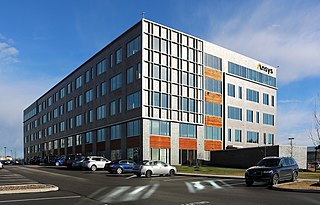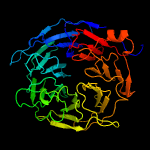
Bioinformatics is an interdisciplinary field of science that develops methods and software tools for understanding biological data, especially when the data sets are large and complex. Bioinformatics uses biology, chemistry, physics, computer science, computer programming, information engineering, mathematics and statistics to analyze and interpret biological data. The process of analyzing and interpreting data can some times referred to as computational biology, however this distinction between the two terms is often disputed. To some, the term computational biology refers to building and using models of biological systems.
Autodesk, Inc. is an American multinational software corporation that provides software products and services for the architecture, engineering, construction, manufacturing, media, education, and entertainment industries. Autodesk is headquartered in San Francisco, California, and has offices worldwide. Its U.S. offices are located in the states of California, Oregon, Colorado, Texas, Michigan, New Hampshire and Massachusetts. Its Canada offices are located in the provinces of Ontario, Quebec, and Alberta.

Ansys, Inc. is an American multinational company with its headquarters based in Canonsburg, Pennsylvania. It develops and markets CAE/multiphysics engineering simulation software for product design, testing and operation and offers its products and services to customers worldwide.
The Rat Genome Database (RGD) is a database of rat genomics, genetics, physiology and functional data, as well as data for comparative genomics between rat, human and mouse. RGD is responsible for attaching biological information to the rat genome via structured vocabulary, or ontology, annotations assigned to genes and quantitative trait loci (QTL), and for consolidating rat strain data and making it available to the research community. They are also developing a suite of tools for mining and analyzing genomic, physiologic and functional data for the rat, and comparative data for rat, mouse, human, and five other species.
Bioconductor is a free, open source and open development software project for the analysis and comprehension of genomic data generated by wet lab experiments in molecular biology.

QIAGEN N.V. is a German-founded multinational provider of sample and assay technologies for molecular diagnostics, applied testing, academic research, and pharmaceutical research. The company operates in more than 35 offices in over 25 countries. QIAGEN N.V., the global corporate headquarter of the QIAGEN group, is located in Venlo, The Netherlands. The main operative headquarters are located in Hilden, Germany. European, American, Chinese, and Asian-Pacific regional headquarters are located respectively in respectively Hilden, Germany; Germantown, Maryland, United States; Shanghai, China; and Singapore. QIAGEN's shares are listed at the NYSE and at the Frankfurt Stock Exchange in the Prime Standard. Thierry Bernard is the company's Chief Executive Officer (CEO).

Apache Taverna was an open source software tool for designing and executing workflows, initially created by the myGrid project under the name Taverna Workbench, then a project under the Apache incubator. Taverna allowed users to integrate many different software components, including WSDL SOAP or REST Web services, such as those provided by the National Center for Biotechnology Information, the European Bioinformatics Institute, the DNA Databank of Japan (DDBJ), SoapLab, BioMOBY and EMBOSS. The set of available services was not finite and users could import new service descriptions into the Taverna Workbench.

CLC bio was a bioinformatics software company that developed a software suite subsequently purchased by QIAGEN.
Biological data visualization is a branch of bioinformatics concerned with the application of computer graphics, scientific visualization, and information visualization to different areas of the life sciences. This includes visualization of sequences, genomes, alignments, phylogenies, macromolecular structures, systems biology, microscopy, and magnetic resonance imaging data. Software tools used for visualizing biological data range from simple, standalone programs to complex, integrated systems.

OpenSCAD is a free software application for creating solid 3D computer-aided design (CAD) objects. It is a script-only based modeller that uses its own description language; the 3D preview can be manipulated interactively, but cannot be interactively modified in 3D. Instead, an OpenSCAD script specifies geometric primitives and defines how they are modified and combined to render a 3D model. As such, the program performs constructive solid geometry (CSG). OpenSCAD is available for Windows, Linux, and macOS.
Knome, Inc. was a human genome interpretation company based in Cambridge, Massachusetts. Launched in 2007, Knome focused on improving quality of life by applying insights gained from the interpretation of human genomes. They helped identify and classify the variants, genes, and gene sets that are likely to govern or underlie a specific disease, tumor, or drug response. Their clients included academic, pharmaceutical and medical researchers. In 2015, it was acquired by Tute Genomics.
GenomeSpace is an environment for genomics software tools and applications. It helps users manage their analysis workflows involving multiple diverse tools, including web applications and desktop tools and facilitates the transfer of data between tools via automatic format conversion. Analyses can use data from local or cloud-based stores.

GrabCAD, Inc. is a Cambridge, Massachusetts-based startup that created a free cloud-based collaboration environment that helps engineering teams manage, view and share CAD files.

Megf8 also known as Multiple Epidermal Growth Factor-like Domains 8, is a protein coding gene that encodes a single pass membrane protein, known to participate in developmental regulation and cellular communication. It is located on chromosome 19 at the 49th open reading frame in humans (19q13.2). There are two isoform constructs known for MEGF8, which differ by a 67 amino acid indel. The isoform 2 splice version is 2785 amino acids long, and predicted to be 296.6 kdal in mass. Isoform 1 is composed of 2845 amino acids and predicted to weigh 303.1 kdal. Using BLAST searches, orthologs were found primarily in mammals, but MEGF8 is also conserved in invertebrates and fishes, and rarely in birds, reptiles, and amphibians. A notably important paralog to multiple epidermal growth factor-like domains 8 is ATRNL1, which is also a single pass transmembrane protein, with several of the same key features and motifs as MEGF8, as indicated by Simple Modular Architecture Research Tool (SMART) which is hosted by the European Molecular Biology Laboratory located in Heidelberg, Germany. MEGF8 has been predicted to be a key player in several developmental processes, such as left-right patterning and limb formation. Currently, researchers have found MEGF8 SNP mutations to be the cause of Carpenter syndrome subtype 2.
Tute Genomics is a genomics startup that provides a cloud-based web application for rapid and accurate annotation of human genomic data. Built on the expertise of ANNOVAR, Tute assists researchers in identifying disease genes and biomarkers, and assists clinicians/labs in performing genetic diagnosis. Based in Provo, Utah, Tute was co-founded by Dr. Kai Wang, an Assistant Professor at the University of Southern California (USC); and Dr. Reid J. Robison, a board-certified psychiatrist with fellowship training in both neurodevelopmental genetics and bioinformatics.
ATUM is an American biotechnology company. ATUM provides tools for the design and synthesis of optimized DNA, as well as protein production and GMP cell line development.
Clear Labs, Inc. is a private genomics testing company headquartered in San Carlos, California, United States. It offers a fully automated, next-generation sequencing (NGS) platform for turnkey diagnostics, including SARS-CoV-2 genomic characterization and detection of foodborne pathogens such as listeria and salmonella. It can also verify a food's ingredients, its GMO status, or conduct other tests.

Color Health, Inc. makes population-scale cancer detection and care accessible, convenient, and cost-effective for employers, health plans, and unions. With nearly a decade of experience, Color has served millions of patients and partnered with innovators such as the National Institutes of Health, the CDC, large public health departments, and more.